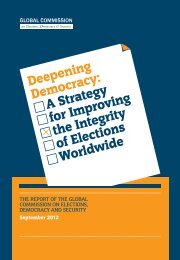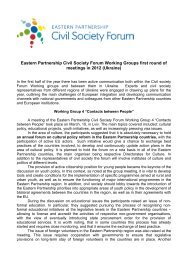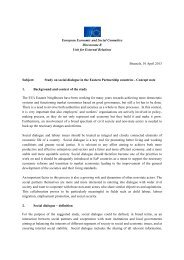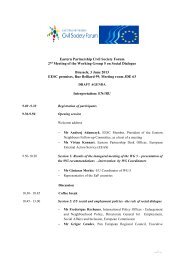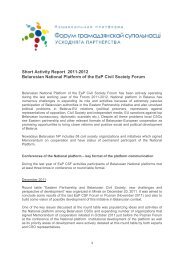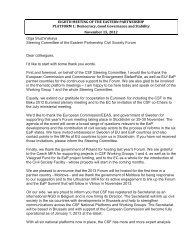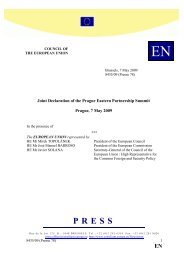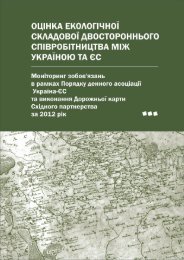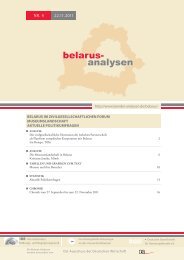Non-formal education - Eastern Partnership Civil Society Forum
Non-formal education - Eastern Partnership Civil Society Forum
Non-formal education - Eastern Partnership Civil Society Forum
Create successful ePaper yourself
Turn your PDF publications into a flip-book with our unique Google optimized e-Paper software.
About 32, 8 % of Azeri pupils who graduated from general secondary <strong>education</strong> (11th form) in<br />
2008 went on to study at higher and middle <strong>education</strong> schools, 6,3 % of them studied at vocational<br />
schools or took professional courses and 57,5% of them didn’t participate in any <strong>education</strong> program<br />
(see diagram5).<br />
Diagram 5: Post <strong>education</strong> study of general secondary <strong>education</strong> graduates in 2008<br />
In recent years, more 70 thousand young people with general secondary <strong>education</strong> haven’t been<br />
reflected by statistics. They enter the labor market directly without gaining any professional training or<br />
they wait for the following year to be admitted to higher <strong>education</strong> institutions or middle professional<br />
schools. This contingent accounts for more than one-third of all unemployed citizens. Thus, vocational<br />
preparation has become one of the key agendas of today.<br />
Importance of non-<strong>formal</strong> (vocational) <strong>education</strong> in Azerbaijan Republic:<br />
Employment Service of the Republic is implementing certain measures for training, retraining<br />
and professional development of unemployed citizens and job seekers on the basis of short-term,<br />
mobile <strong>education</strong> programs. Their activities involve providing applicants with appropriate jobs after<br />
completion of higher <strong>education</strong>, taking into consideration the demands of the labor market. Vocational<br />
training courses are then organized for the applicants in cooperation with the Ministry of Education<br />
or Employment Centers. The majority of people who participate in the vocational <strong>education</strong> courses<br />
organized by Employment Service are first time participants (92%). Additionally, 81% of them are<br />
younger than 35 years old (see table 2).<br />
It’s very important to select good listeners when forming an organization for vocational courses.<br />
Information such as: previous vocational profession and professional experience, work tendencies,<br />
abilities and skills as well as other socio-psychological factors of job seekers must be taken into<br />
consideration in order to provide job seekers with new professions that best match their needs. While<br />
forming the participants, the specialists of the Employment Service should take into consideration the<br />
closeness of <strong>education</strong> institutions from a geographical point of view together with mutual relations<br />
and other individual features. Currently, the bodies of Employment Service conduct professional<br />
development courses on 85 different specialties (see table 2).<br />
Within the framework of “Development of Social Defense System” project signed with UNDP, the<br />
government of Azerbaijan has implemented “A Program on improvement of <strong>education</strong>al methodic<br />
base and technical program provision of vocational <strong>education</strong> system of job seekers and unemployed<br />
citizens”. The Program seeks to improve vocational <strong>education</strong> for job seekers and unemployed<br />
citizens in state employment bodies in accordance with the real needs of the labor market as well as<br />
international standards. Within the framework of the mentioned project, module <strong>education</strong> programs on<br />
15 competitive professions and specialties in the labor market have been elaborated.<br />
29




